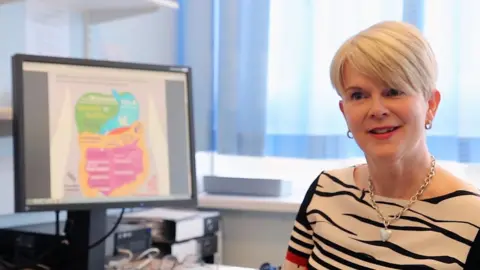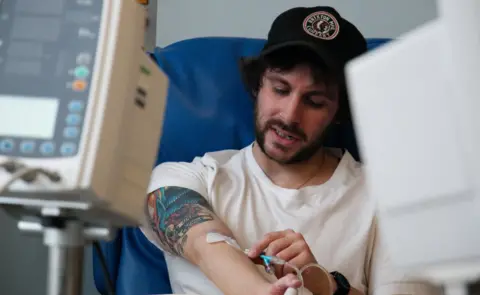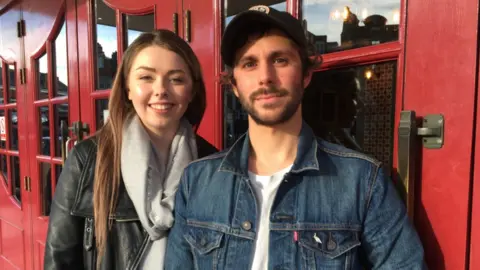Crohn's patients need a 'national standard' for treatment
One of the UK's leading Crohn's disease specialists says there should be a national standard for treatment.
Dr Cathryn Edwards, president of the British Society of Gastroenterology, told Newsbeat: "We try to not have a single doctor with single patients, but have a team.
"There need to be standards across the country so patients have equal support."
Newsbeat's latest documentary looks at the challenges of living with Crohn's.

The number of people diagnosed with Crohn's has been on the rise in recent years.
The inflammatory bowel disease (IBD) can affect any part of the digestive system with symptoms ranging from severe diarrhoea and blood in stool to extreme tiredness.
The increase is greater in younger sufferers.
According to the NHS, in England the number of 15 to 29-year-olds diagnosed has increased from 9,256 in 2007 to 29,624 in 2016.

The documentary, On Tour with Crohn's Disease, follows Mark Holley from Black Foxxes and how he copes with the condition as the band play some of their biggest shows to date and record their second album.
"I put it off for years," he explains. "I was really ill at university and I chose to not go to the doctors. I was basically convinced I had cancer.
"Then one Christmas I lost two and a half stone (16kg) in two weeks. That's when I went to hospital. They said I could have died. I was that ill."

There's currently no known definitive cause or cure for the condition.
"It's a real worry, all they can do is suppress the symptoms," says Mark.
"The problem with Crohn's is, because everyone's condition is so different, it takes a long time to tweak drugs specific for you."
Mark trialled different treatments for six years before finding one which kept his condition, for the most part, under control.
"In terms of long-term side-effects, they have no idea what they are. You sign these wavers that say 'side-effects may include death', which isn't really a side-effect.
"You are essentially a human guinea pig to these drugs."

Speaking about current treatment, Dr Cathryn Edwards says: "We don't have a magic wand. What we do have are lots of new drugs and treatments coming into our toolkit which will put the disease into long-term remission.
"I'm not saying it's going to be easy to unpick the fundamental underlying cause. I don't think there will be just one.
"But we are expanding our knowledge and we're keen to both predict and then be more personalised about the way we deliver medicine for individuals.
"The first goal is to get patients well and not allow their disease to dominate the best parts of their lives."

Despite knowing he's likely to have the condition for the rest of his life, Mark says he's never let the illness beat him.
"The moment you get comfortable with being ill is the moment you can do anything as a career, you can literally do anything," he says.
"It would be easy to be stagnant. If anything, it's pushed me to go and do more."
Find us on Instagram at BBCNewsbeat and follow us on Snapchat, search for bbc_newsbeat
